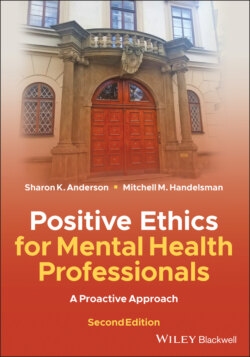Читать книгу Positive Ethics for Mental Health Professionals - Sharon K. Anderson - Страница 17
Self-Care: The Basics
ОглавлениеClearly there are immense rewards for being a therapist and many find it a truly noble way to make a living. At the same time, psychotherapy is taxing and emotionally draining; authors have used phrases like “significantly stressful” (Cottone & Tarvydas, 2007, p. 123) and “inherently stressful” (Welfel, 2006, p. 58). We work with people who are unhappy, ineffective, dissatisfied, angry, anxious, and/or lonely, and who sometimes really want to stay unhappy, ineffective, dissatisfied, angry, anxious, and lonely. Under these conditions, they challenge us to be that person in their lives who brings hope, a point of connection, stability, and caring confrontation. The increments of change we may see during the therapy process are often very small. In addition, we rarely know of the positive outcomes for clients that happen long after termination. Thus, we often do not fully collect on the promise of good feelings after a job well done.
These conditions and other factors that may be out of our control (e.g., reimbursement from insurance carriers) constitute a recipe for emotional exhaustion. We need self-care strategies to prevent the harmful effects of these stresses and to help ourselves when we start to feel detached, overwhelmed, and burned out (Jevne & Williams, 1998). We need to be on guard for the telltale signs of such stress, like fleeting hopes that our clients call to cancel their appointments, impatience with our clients, and musing between sessions about going back to school to study geology or taxidermy. You need to be your own best friend and make a strong commitment to take care of yourself. Those who need your help—your clients—won’t be asking you if you are getting good rest at night, taking periodic vacations, exercising regularly, or are involved in healthy personal relationships. You need to be checking in on yourself and seeking assistance from colleagues. Ask yourself questions such as these: How do you know when you are stressed? What are your telltale signs? What are your first reactions when you feel stressed? What are some ways you try to cope with stress? Would you characterize these as healthy, unhealthy, or ineffectual? What might you do differently to cope better with stress?
Myers et al. (2000) describe the concept of wellness as “a way of life oriented toward optimal health and wellbeing in which body, mind and spirit are integrated by the individual to live more fully within the human and natural community”(p. 252). Personal wellness is critical for our own wellbeing so we can draw from our core and pursue professional excellence. Spending time and effort on ourselves is part of our ethical obligation, in addition to the time and effort we spend on behalf of our clients. As Skovholt and Trotter-Mathison (2016) state, “Maintaining oneself personally is necessary to function effectively in a professional role. By itself, this idea can help those in the caring fields feel less selfish when meeting the needs of the self” (p. 161). In an important sense, wellness and self-care are to stress reduction as positive ethics is to ethics—it allows us to go beyond the minimum and reach a higher level.
As a way to evaluate your self-care, consider the following list of categories. For each category, give yourself a rating of 0–5, with 0 meaning “no self-care” and 5 meaning “good self-care” in the category.
_____I encourage myself to experience emotions—all kinds of emotions.
_____I have my finances in good to great shape.
_____I laugh at least once during each day.
_____I give other people, as well as myself, a compliment most every day.
_____I have a healthy diet when it comes to food.
_____I walk and/or get exercise sometime during my day.
_____I hydrate regularly with water.
_____I get sufficient sleep on a regular basis.
_____I have hobbies or activities that I do only for fun.
_____I keep my life’s priorities front and center and don’t let the tyranny of the urgent draw me off course.
_____I stop and just breathe when my day starts to feel stressful.
_____I give myself permission to be alone when I need solitary time.
_____I turn my phone off.
_____I take time to foster my spiritual or religious self.
_____I have at least one healthy relationship in my life.
Now go back over your list and see if there are any scores you wish to change. If yes, write an action plan for one of those items. Keep this list handy so that you can retrieve it on a regular basis. We would suggest that you do this activity at least twice a year.
In spite of the inherent stress of psychotherapy, there are ways to stay vibrant in the profession. Skovholt and Trotter-Mathison (2016) encourage professionals to seek out those experiences in their personal lives that promote happiness, fervor, energy, and tranquility. Of course, the list you develop to experience these will likely look different from your colleagues’ or classmates’. That’s fine. The key is to make the list and then implement your list on a regular basis. It is also important to remember that your list will change over the years as you develop as a person and a professional. And remember to have lots of items on your list that are not connected to your professional activities! Your list should be a personal one, not a professional one.
